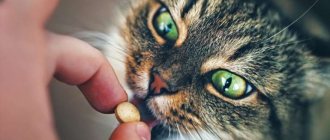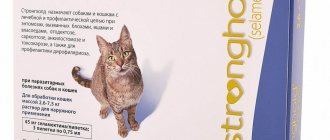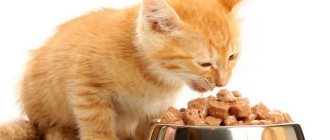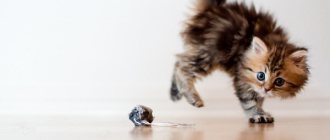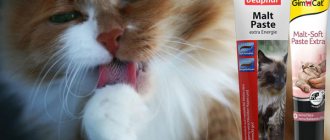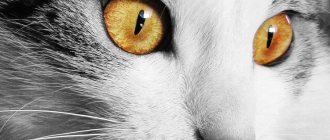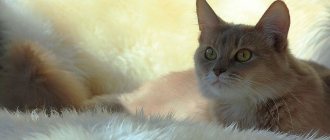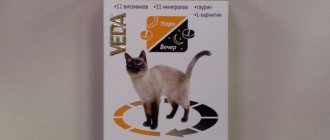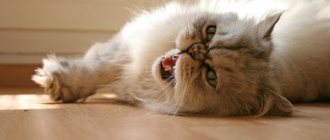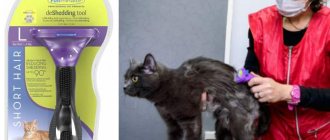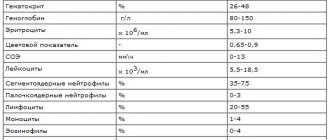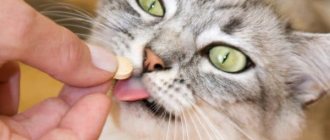13029Administration
1
For a cat, vitamins against hair loss are not a whim or a whim, but a necessity and a guarantee of a beautiful, shiny coat. For the owner, this is a solution to the problem that most pet owners face: hair scattered everywhere, which makes the home untidy, gets into the lungs and stomach, causing damage to the health of both people and the cat itself.
Therefore, it is better to take care of vitamins, even if you have to spend a little money, than to endure such troubles. This article discusses exactly what substances a cat’s fur needs, what medications veterinarians advise to give, and what to feed the animal so that its coat looks “A+.”
© shutterstock
Which vitamins are deficient in cats and can cause hair loss?
The cat's body urgently needs all vitamins and microelements to one degree or another. But the following substances are most required for your pet’s fur and skin:
- vitamins of group B, A, E, D;
- sulfur, iodine, zinc, calcium;
- fatty acids – Omega-3, Omega-6.
B vitamins help improve the function of the digestive organs, significantly strengthen muscle tissue, improve the general well-being of the cat, and prevent hair loss. B6, which helps the production of taurine, improves metabolic and energy processes in the pet's body. A lack of taurine leads to pathologies of the cardiovascular system, digestive tract, problems with the liver and kidneys. This significantly affects the condition of the cat's coat.
B7 (biotin) is part of many enzymes. It is better to use it with sulfur. It regenerates the skin, fights hair loss, strengthens the animal’s nervous system, and regulates protein and fat balance. The lack of biotin leads to inflammatory processes in the hair follicles, causing hair loss. B vitamins are found in foods such as pork, beef, poultry, fish, liver, carrots, potatoes, egg yolks, and fermented milk dishes.
We recommend reading: Potatoes: beneficial properties and contraindications
Vitamins of group A take care of the thickness and shine of the cat's coat and increase immunity. Contained in liver, offal, eggs, pumpkin, carrots, sweet peppers, spinach.
We recommend reading: Chili peppers: benefits and harms, properties, how to eat them
Vitamin E ensures full growth of the cat's fur and increases resistance to various infections. Contained in oils, salmon and some other types of fish, dairy products.
We recommend reading: Benefits of bell pepper, properties
Cats can lose hair for a number of other reasons:
- Seasonal shedding. Twice a year cats experience intense hair loss - in spring and autumn. In this way, animals change their “coat” to a new one, more suitable for the coming season.
- Diet. Incorrectly selected food, food from a common table, food devoid of minerals and vitamins will sooner or later lead your pet to vitamin deficiency. The cat's fur will be the first to react to this. Diet is the most common cause of hair loss.
- Often, various diseases affect the appearance of the coat. The causes may be helminthic infestations, fungal diseases, allergies and other pathologies that lead to hair loss.
In all these cases, you should purchase vitamin complexes for your pet to keep the coat in order and prevent its loss.
Parasites
Allergy is an unpleasant disease, but it can be controlled, and attacks of itching are eliminated with medication. More serious harm is caused by parasites that live on the skin and in its layers.
Quite often cats go bald due to:
- Flea dermatitis - the cat is infected with fleas and has an intolerance to the components of the parasites' saliva. Flea bites itch, the situation is further aggravated by an allergic rash, which significantly increases the itching. The problem is that flea dermatitis can develop even if there are 1-2 fleas on the cat, that is, at the earliest stage of infection.
- The subcutaneous mite is one of the varieties of microscopic mites that lives not on the skin, but on its upper layers. Parasites gnaw tunnels in the skin and constantly move through them. The condition is accompanied by severe itching and loss of six.
- Ear mites – when infected with this parasite, a cat quickly scratches its head, face and ears. Bald patches quickly turn red and become infected.
- The scabies mite is a parasite that spreads quickly and can live on any warm-blooded animal (and humans). Due to severe itching, the cat scratches the skin, which quickly becomes inflamed. Infected animals quickly lose hair and develop severe scratching.
- The lice beetle is another parasite that infests the hair follicles. The lice eater feeds on the skin, blood and directly on the fur of the animal. It is impossible to detect the parasite visually; for diagnosis you need to take a skin scraping.
To prevent parasites, your cat should receive regular preventative care. The pet must be treated even if it does not go outside, since ticks and fleas can be brought into the house on clothes or shoes. If the cat is already infected, treatment and prevention of the spread of parasites is required. When infected with subcutaneous and other types of ticks, the animal's bedding and personal belongings must be carefully processed or burned.
What vitamins are best for cat fur?
Vitamin complexes are intended for cats that are naturally fed. The most common form of release is tablets and liquid solutions. There are also gels, powders, drops, capsules. You should choose them based on your pet’s preferences and in terms of convenience. For example, gel, powder, drops can be disguised in a portion of food. In this case, there will be no need to give them forcibly. Therefore, many owners prefer liquid vitamins for their cats if they have hair problems. In case of serious health difficulties, the veterinarian prescribes vitamins in the form of injections and injections.
Attention! The dosage of vitamin preparations is determined by a veterinarian or the manufacturer’s instructions should be followed. Excess of active substances can be dangerous to your pet's health.
How to balance your diet?
You won't invent anything new. If your cat eats commercial food, consider switching to a product from a different manufacturer or a higher grade. When keeping a natural diet, the cat must be fed correctly.
The diet is based on meat and offal. Please note that the cat should consume up to 80% protein food per day , that is, meat, dairy or fermented milk products. If the cat has no problems with weight gain, it is better to exclude porridge from the diet. Fish should be considered as a delicacy, that is, little by little, rarely, and only noble varieties. In addition to proteins and fats, the cat needs hard fibers, and these are vegetables and herbs. Naturally, vegetables need to be chopped and mixed with meat or dairy products. Cats most often eat greens and grass themselves.
Note! If you are on a natural diet, be sure to take vitamin courses at least 2 times a year.
The best vitamins for cat skin and coat
Vitamins “Phytomins” from a domestic manufacturer are suitable for restoring fur in British cats. They contain brewer's yeast, plant extracts, mineral supplements, collagen, taurine and sulfur. Noticeably improves hair growth, strengthens roots, and prevents hair loss. The drug is produced in the form of granules. Can be used for a long period.
Beaphar Kittys Mix is considered a good vitamin for cat fur. This is a complex of vitamins in the form of a treat with different flavors. The product contains all the necessary vitamins for a pet’s healthy coat, as well as a number of microelements. The drug restores the cat's coat, prevents hair loss, improves vision and functioning of the cardiovascular system, and strengthens the condition of the pet's claws and teeth. Among the disadvantages, the increased sugar content is noted.
FeliDerm vitamins from a German manufacturer are designed for the fur and skin of cats during shedding. They also solve more serious problems - allergies, metabolic disorders, hormonal disorders. The composition includes biotin, Omega-3, amino acids, zinc, brewer's yeast. The complex has natural ingredients: algae, flour, meat, liver, egg, whey. The drug relieves skin itching, prevents hair loss, has good taste, is used very economically, but buyers note its high cost.
The drug "Canina Canivita" is produced in the form of a tonic. Suitable for cats of all ages. The effect of using vitamins occurs in the shortest possible time, since the product immediately enters the bloodstream. Recommended for cats with thick, long hair. After a course of treatment, it becomes smooth, stops pilling, acquires shine, and excessive hair loss stops. The drug relieves inflammation of the skin and eliminates itching. In addition, vitamins well regulate the animal’s sexual cycle. The disadvantages include the bitter aftertaste of the drug.
Vitamins "Doctor Zoo" can be used in different forms of nutrition. They contain all the necessary vitamins, as well as phosphorus, potassium, manganese, zinc, and copper. Thanks to the content of taurine and biotin, the condition of the skin and coat is quickly restored, and metabolism is normalized.
“Laveta Super For Cats” is a vitamin complex for cats taking part in exhibitions, including the Scottish breed. Contains vitamins B, E, as well as taurine and biotin, which provide your pet with shiny, healthy coat and skin.
“TM Excel Brewers” - vitamins for those cats with intense hair shedding. Cats change it twice a year. To make the molting period more comfortable for the animal, it is imperative to give the pet vitamin complexes. This preparation contains fatty acids, all essential vitamins and microelements, and extracts of some plants. They prevent dandruff, hair loss, and eliminate hair fragility.
Vitamins "Radostin" from a domestic brand are suitable for sterilized cats against hair loss. Neutered animals also need special care and feeding. The drug contains multivitamins and prebiotics. Indications for use include nutritional problems, hair loss, and preventive measures.
It is worth noting the drug Malta paste. It contains malt extract, oils, fatty acids, and plant products. Designed to remove lost hair from the digestive tract. It has a pleasant taste, effectively combats hair loss, and minimizes seasonal shedding in animals. Available in tubes.
Important! In the process of taking vitamin preparations, it is necessary to carefully monitor their effect on the cat. The products can lead to allergies and other negative reactions in the pet’s body.
Rules for using cat vitamins for fur
In addition to the varied release form, the complexes have a certain concentration of active substances. Therefore, they should be used based on the instructions or the instructions of a veterinarian who will advise the dose and course of administration. For various diseases that require a therapeutic dose, vitamins should be used strictly as directed. They are usually used during inflammatory processes and infectious diseases.
Vitamins that are recommended for preventive use contain a minimal concentration of beneficial substances. It is determined by daily requirement. Their dosage has no therapeutic effect and is prescribed for the prevention of vitamin deficiencies.
Contraindications and side effects
When an excessive amount of active substances enters a cat’s body or there is an individual intolerance to the drug, this leads to an overdose and unpleasant consequences for the animal.
In case of an overdose, a pet may experience:
- hair loss;
- itching and rashes of the skin;
- deterioration or lack of appetite;
- some swelling;
- increased anxiety.
In more serious cases, reproductive function is impaired, and disruptions in the functioning of the heart, liver, and kidneys are observed. You should not overuse vitamins if your cat has cancer, inflammatory processes, or allergic reactions. In such cases, vitamins can harm the animal.
Vitamins should be used with caution in weakened animals with chronic diseases, pregnant and lactating cats. The course of treatment, the vitamin complex, and its composition are agreed upon with a veterinarian, who will select the correct drug based on the pet’s physiological well-being, age, and general health.
Veterinarian advice
The opinions of experts boil down to the fact that animal hair often falls out regardless of the time of year and molting period. For them, this is a reason to prescribe treatment. Reviews from veterinarians about vitamins for cat fur speak in favor of the drugs.
To prevent hair loss in cats, veterinary specialists recommend:
- Regularly brush your pet’s fur with special brushes;
- use shampoos with the right pH to bathe your cat;
- adhere to the correct feeding regimen for your pet;
- add vitamins and microelements to the diet;
- do not feed your pet from the common table;
- clean the cat's litter box in a timely manner;
- Vaccinate the animal in due time.
You should only bathe your cat if it is heavily soiled and cannot be removed on its own.
Fungi
Fungal infections, better known as lichen, are characterized by hair loss in certain areas of the skin. If the animal does not receive treatment, the affected areas of skin enlarge and merge together.
Depending on the type of fungus, receding hairline patches may appear clear, scaled, scabbed, or scratched. The first signs of lichen are often overlooked, so for the purpose of prevention, the cat must be completely examined once every 2-3 days. A small, round patch of hairless hair is an almost guaranteed sign of the most common ringworm. Please note that ringworm (and others) is quickly transmitted to people and other animals.
